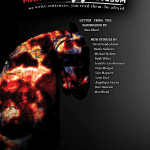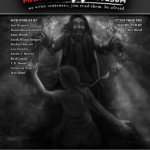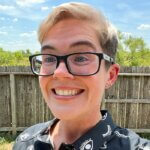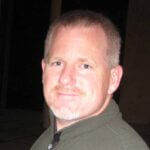Growing up in those days, every kid on my street knew Halloween was a big deal. Every yard and every house was decorated. The ones that kept their porch lights off or refused to give candy were marked ahead of time for window soaping or tee-peeing. We chafed at school, eager to get home to dress up as vampires, ghouls, and monsters. No modern worries about sugar and processed foods. My cousins had caries and fillings from drinking Pepsis and eating candy every day. Back then, “family size” meant you could sink your arm to your elbow into a bag of chips and not hit bottom.
Uncle Buddy lived with us at the time. He’d been to Vietnam. The Army discharged him and shipped him back. My father grumbled something about Agent Orange, which sounded like a new flavor of Kool-Aid. My two sisters and I were told never to mention the war, but Uncle Buddy didn’t talk much to us. I broke the rule once when I asked him about a fatigue jacket in his closet that had a patch with a large grinning rat on it.
“That’s a tunnel rat,” he told me. “See the motto underneath? Can you read it?”
Being an altar boy, I knew some Latin from serving Sunday mass. “Non Gratum Anus Rodentum,” I repeated. I knew anus from school. Who didn’t? “An ungrateful rodent’s … behind.”
“Close,” Uncle said. “Not worth a rat’s ass.”
He flopped on his bed, his hands crossed behind his head, muttering it like a mantra: “Not worth a rat’s ass … not worth a rat’s ass …”
I didn’t think he noticed me walking out of his room. “Hey, Paul,” he said.
“Yes, Uncle?”
“Watch for razor blades in apples when you go Halloweening. Lots of crazy fuckers out there,” he mumbled. I closed the door; he was repeating it to himself: “… lots of crazy fuckers.”
In our house, my parents were devout, never drank or cursed. The world was changing fast. Television programming shook off boring variety shows like Lawrence Welk and “His Band of Renown.” Sitcoms once halfwit jokes and canned laughter gave way to edgier comedy. Nobody’s family on our block looked like The Brady Bunch.
My sisters and I went up and down Walnut Boulevard like always on Halloween. Northtown was years from imposing a two-hour time limit for trick-or-treating. Some older kids stayed until midnight, banging on doors asking for “leftover candy.” The standard “trick or treat” line came with a little threat because windows were soaped, car tires deflated, and—though rare—real damage was done to houses and property: Day-Glo graffiti on walls, vehicles, or turfed lawns. Last year, some sicko killed the Neumanns’ Siamese they let out at night.
We didn’t have to go past Walnut back then to get our bags filled with candy. Not just the despised candy corn but Snickers, Three Musketeers, and Mars almond candy bars. The regular-sized ones, too, not the minibars of today.
After a couple hours, we had worked our way close to Highland Beach at the end of Walnut. The streetlights shed an upside-down cone of hazy orange light onto the streets. The wind picked up a chill from the open lake and my ghost costume—a shoddy affair with nothing but eyeholes cut into a sheet my mother reluctantly surrendered—was whipping around my legs and sending chills up my back.
The biggest house, the one we hoped to score the most candy from, was the Kopko Mansion, a massive house overlooking Lake Erie. It was the biggest house in the city and home to the wealthiest family, all of whom made the society pages of the Northtown Herald-Tribune at one time or another. The property extended on both sides and across the street with a manicured expanse of lawn bordered by hedges cut to mathematical precision in summers. Years ago, my sisters and I decided one day to have a picnic in their Japanese garden. We walked to the back of the estate and crossed an arched stone bridge that looked like something from a landscape painting. I recall walking up to the back of the house to ask for a “church key” because we’d forgotten to bring a bottle opener for our Coke-a-Colas. They gave away candy in bundles. It was the capstone of the night’s house-to-house begging.
The handmade sign taped to the huge front door said: PLEASE NO HALLOWEEN SICKNESS HERE.
I went back down the long winding sidewalk bordered with mums and told my sisters.
“Let’s go home,” my older sister said.
I argued for more candy but we took a vote and I lost. We trudged home, slightly disappointed that the Kopko manor hadn’t provided the grand finale we expected while dressing to go Halloweening.
My parents were at a church service of Our Lady of the Seven Sorrows and hadn’t returned. Uncle Buddy was in the kitchen smoking and drinking. As soon as my sisters spied the beer bottles and ashtray on the table, they retreated upstairs without a word. Uncle Buddy’s eyes looked glazed. I wondered what our parents would say when they returned. Smoking and drinking in the house were on a par with Baal worship. My father was much bigger than his younger brother, but there was an aura of suppressed fury about my uncle that reminded me of the raccoon Johnny O’Keene and his brother Joe trapped down by the breakwall.
“How it go, punk? Get a lot of candy tonight?”
He’d never called me that before. Suddenly the glassy stare in his eyes didn’t seem altogether owing to alcohol.
“Pretty good, Uncle,” I replied. “All but the last house.”
I told him about the sign on the Kopko mansion door.
“Halloween sickness, huh. We’ll see about that. You wait right there. I’ll be back in a second.”
I didn’t like the sound of it, but I was afraid to defy him. Part of me admired his murky past like Jack Palance in his all-black duds in Shane. Shucking my costume, I sat opposite his chair, tucked the dirty ends of the sheet higher to keep the muddy fringe off the floor, and stared at the Stroh’s empties on the table. He came down the back stairs fast, the tromp of his boots heavier than I remembered. He moved like a cat around the house, according to what I overheard my father say to my mother one time.
Uncle Buddy carried a bedsheet in his arms. Before I could ask what he was doing, a knife came out of nowhere and he slit a pair of eyeholes in the sheet.
“Let’s go,” he commanded. “Put your costume back on. Show me that house.”
My stomach fell. I did what he said and led him up the street past the houses that had shut off the porch lights to signal an end to the candy giveaway. Roving teenagers behind us yelled in loud voices to one another echoing in the night air.
On the way, he talked to me. But to this day I can’t recall much of what he said. I must have stored some in my neocortex to digest later. It was about the war. I remember the tone and the emphasis he put on certain words like rich people, grunts, and lowlife sonsofbitches. I didn’t connect his war experiences with the words I was hearing. I was too afraid. I kept picturing that knife blade flashing out of nowhere. My uncle was somebody I didn’t recognize anymore.
Around Myrtle Avenue, a couple older boys approached. Their costumes were little more than greasepaint on their faces.
“Hey, check out the ghosts,” the bigger one said. “Give us your candy, ghosts.”
My uncle ignored them, splitting them apart on the sidewalk like a bow wave with me in his wake.
“Hey, asshole, watch it,” the big boy said.
We kept walking. My mind was in turmoil. I decided that, if I got the chance, I’d bolt as soon as I had enough distance between us. I figured Uncle Buddy would go straight up the sidewalk entrance to the front door.
I was wrong. As we reached the edge of the shrubbery fence, he grabbed my triceps hard enough to make me yelp and hurried me around to the back where a stand of birch trees shielded the house.
“We’re going in this way. Stay behind me. Make sure I know you’re there.”
The last was as clear a threat as I needed to obey. At that moment, I hated my uncle. But I feared him more.
We walked along the hedge line, backs humped to avoid detection from the upper windows. Waves crashed against the shoreline like huge bags of marbles scattering. I shivered from the cold wind.
“Wait here,” he hissed. “I’m going to check it out.”
Without a moon or light from the distant streetlights, I couldn’t see where he went in the pitch-black. I sensed he was gone and felt a mix of relief and fear he’d return.
Long minutes passed. Time seemed either frozen the way it felt at school sitting in my desk or it skipped ahead with my thoughts racing to keep up. Then I thought of the sign that put me in this position: PLEASE NO HALLOWEEN SICKNESS HERE …
We called one another “morons” and “idiots” all day long at play, whether a broken pass at a football scrimmage in the schoolyard or down by the water building forts in the cattails.
It hit me. The sign wasn’t insulting Halloweening. It was what my teachers often rebuked me for and upset my parents, fanatics over our education in those days, even half-senile Sister Regina, who wrote “sloppy punctuation” all over my essays.
“Please, no Halloween. Sickness here.”
But it was too late to call Uncle Buddy back and explain it to him.
I never heard him return. He grabbed at my shoulder, bunching it in his fist, and shoved me ahead of him toward the house. When I opened my mouth to explain the simple misreading of the sign, he squeezed my jaw shut with his free hand. “You give away our position, soldier, I’ll gut you like a fish.”
… like a fish …
The words were ice injected under my skin. I had images to go with them, too—rotting, smelly carp and sheepshead washed up on the shoreline at the beach. Fishermen often tossed them away off the breakwall as garbage fish, not good eating fish. For fun, we filleted them, pulling their guts loose and throwing them on the sand to rot in the sun. My dog would roll on the fishbones and come home stinking. I was told to scrub him and he wouldn’t be allowed in the house until every trace of stench was gone.
Buddy lifted one of the metal hatch doors and forced me to go down ahead of him. I couldn’t see anything in the blackness. I remembered the rat patch in his closet and wondered if he had some supernatural ability to see in the dark. A wooden door was pried open at the bottom of the steps. He pushed me into a large space, a cavernous blackness that smelled of must and brisk dust.
“I’m going to sneeze,” I said.
My uncle’s hand clamped my mouth shut so hard I felt warm blood in my teeth.
“Don’t make that the last thing you do, Paul,” he hissed in my ear.
A red veil began descending over my eyes, and I knew I was about to faint. I had done it once at Christmas mass after fasting for Holy Communion and embarrassed my older sister. When I woke, I was still in the dark. But I was sitting down. My ghost costume was in my lap, wet. I tossed it aside, thought I must have urinated on myself while unconscious. The room seemed different from the one we’d first entered, narrower. I made out certain oblong shapes in the dark, some rectangles of grayish light from those glass block windows, the kind that bordered an abandoned textile factory in the harbor we played war games in. It seemed a cruel irony for me to reflect later on that, like my tunnel rat uncle, I had crawled beneath the floors of that old factory like a rat myself.
Sounds above my head, footfalls, the merest whisper of creaking floorboards. I made out steps leading to the upstairs. I was terrified that, any second, someone inside would fling open the door and expose me sitting there.
This was my chance to escape, run for my life. I got up, tried to feel my way along the walls. I kept banging my shins into things—boxes, equipment, tools. I couldn’t find my way back to the other room. It was like a maze down there with rooms leading off of other rooms. Some cluttered, others empty. I slapped my hands against a dozen wooden doors but never the one that led out from the cellar. Every door felt sticky to the touch, as though it had been freshly painted.
Like a lost hiker in the woods, after what seemed like hours of wandering blind, I returned to where I’d started. The same risers leading to the upstairs floor. I couldn’t take another minute down there. Desperate to flee, I crept up the stairs like a slug pulling itself across a pane of sidewalk. My plan was to crack open the door, look for a door to the outside and run for it. With a house this size, if lucky, I’d be out and gone before anyone in the house knew I was there.
At the top of the stairs, I eased the door open and held my breath. The house wasn’t dark like the basement but it was in semi-darkness with little light from nearby windows. A television set played somewhere. I didn’t know whether I was facing the front or the back.
Inching the door open farther with my fingertips, I felt the same stickiness. I must have touched paint downstairs and had it on my hands. My palms appeared black and felt tacky. I entered looking for a doorway. The carpeting was plush and baffled any noise I made. I crept along the walls. I had no idea where Uncle Buddy was and thought he did this to play a mean joke on me.
Passing through two spacious rooms with heavy furniture, I came to a step-down room off to my right where the TV set was. I glimpsed the top of a bald man’s head leaning back in a recliner like the La-Z-Boy my father insisted on buying. Unlike my father who snored with a racket, that man must be deep asleep. The electric blue light from the TV settled on a bright patch on his head. I held my breath and kept moving.
Holding a hand up in case of another sneezing fit, I saw my bloody palm and it panicked me. I did an awkward stutter-step and bumped into a table with a vase of flowers and photos in frames. The vase tipped over, hit the glass tabletop, and shattered. Photos and shards of vase rolled to the floor. I was already in a sprinter’s stance set to run. At the same instant, I realized the blood on my hands wasn’t mine. The man in the chair had not moved an inch despite the noise a few feet away.
The wet bedsheet in the basement, the ghost costume—not mine …
The realization hit me in a flash: Uncle Buddy’s sheet. He had carried me to that spot and had thrown it in my lap. Where had the blood come from?
I can’t explain my curiosity to this day. I wasn’t known for courage. But I had to see for myself. I knew the man in the chair wasn’t going to get me even if he woke up. I’d be out the door before he was out of his chair.
It wasn’t sleep that immobilized him. He was dead with his throat cut. The TV gave enough light for me to see the hideous smile that gaped below his chin. The red blood appeared dark, almost black. The urge to vomit was stifled by the sound of footsteps coming down wooden steps—heavy footsteps. I flattened myself to the wall near the fireplace.
Carpeting muffled sound afterward but when the door to the cellar was flung open and then those boots began descending, I knew my uncle was going down the steps looking for me. I raced to the other end of the house as fast and as silently as I could go. Another room that blurred in the periphery of my vision, a kitchen. Had to be a door to the outside somewhere …
A smaller dining room off the kitchen. French doors behind lacy sheers, a patio. If I could reach the handle to unlock it, I’d be outside in seconds—
Someone running. Choose: fumble at the sheers, try to unlock the door—and be run down from behind. Or hide. I hid.
The pantry was separated from the kitchen by a slatted pair of swinging doors. I went in, closed the doors as softly as possible and moved backwards unconsciously, bumping into cardboard boxes and loose cans spilled all over the floor. I sat down against the shelves along the back wall. I whimpered, clamped my own hand over my bruised mouth and waited for the footsteps. They were in the kitchen now. I thought of my father’s words about Uncle Buddy and how he moved around in the dark like a cat.
Sounds in the kitchen, no attempt to be silent. Fumbling at the French doors, sliding along the rails and banging into the frame. Boots running over the flagstone patio, searching.… Searching for me. I was about to dive under the opposite shelf and hide behind boxes of paper towels when I saw a foot sticking out from behind. A small foot like a girl’s attached to a slender leg. An older woman’s face, possibly a maid, her thin body bent and twisted under the shelving. Her mouth open as if she died screaming.
I opened the pantry doors and saw the bottom of the sheers fluttering in the wind. I ran the way I’d come, aiming my body for the front of the house. My brain lost in the citadel of my terror. I’d have jumped through glass to get out of that house at that point. I was almost to the front door when I heard him on the front steps coming fast—Uncle Buddy backlit from the streetlights.
Before he could see me, I veered left off the marble foyer and barreled up the stairs. My sneakers made squeaking noises as each foot hit a varnished step. I took them three at a time like a hurdler. The glass in the front doors rattled and shook as Uncle Buddy tried to pull the big door open.
From the top of the stairs, I heard glass breaking.… Go right or left?
I went left, dipping my shoulder into the curve and kept my feet moving fast. I went down the long hallway without breaking stride. It felt like running in a tunnel. Portraits in paintings on the walls ticked past my vision. I aimed for the farthest door at the end of the hall.
Pushing it open, I saw two people in bed sitting upright. They stared at me. I lost my balance, skidded on a throw rug, and slammed down hard to the floor, arms flailing and knees buckling. I collided with a night table and sent lamp, books, and a small clock to the floor.
Struggling to my feet, I spluttered incoherently, begging these two people before I understood what I was seeing in the dim light. Their faces were stiff, the woman’s eyes at half-mast; pools of blood collected at the sheets and stained their waists in jagged crimson haloes. Without formulating a thought about what to do next, I pulled up the quilt and threw my body over the two corpses to tighten myself into a ball between them. They were nude, still warm.
I don’t know why I did it or why I knew that hiding under the bed would have gotten me killed seconds after Uncle Buddy stormed into the room looking for me. I had only seconds to worm my way between their slick bodies and try to adjust the coverlet to look the way it did when I glimpsed them lying so peacefully murdered in their bed.
His boots thudded down the hall with a roar coming out of his throat that was an anguished cry of frustrated rage.
The door banged against the wall when he entered. Despite my determination to lie still, to be invisible in the space between the dead, I shivered. He swatted the light switch. In my dark cave, I felt the lightening above and around me in the room.
“Paul! Paul! God damn it, where are you!”
The bed sank lower as he placed a hand on the edge to look beneath it.
“Come out, come out wherever you are! Olly, olly oxen free,” he sang.
I heard him moving around the room. He opened the closet and rooted among the clothes, tossing, and kicking shoes and items into the bedroom. I took silent, shallow breaths and tried to still my noisy heartbeat.
“Fuck.”
More glass breaking. Something big thrown out a window. Time did that crazy, warbling thing again, stopping and speeding up. I pictured him staring at the faces of the two people he’d killed. Had he flipped the covers down to expose me curled in a fetal position, I have no doubt the next thing I’d feel would be his knife plunging inside me repeatedly. But nothing happened.
It seemed like a day and night had passed before I knew he had left the room without making a sound.
False dawn enveloped the room in a gauzy haze. I sensed my body’s adjustment to the circadian rhythm. Hours of taking in the coppery smell of blood from gaping stab wounds had dulled my wits and sickened me. I had been breathing through my mouth without realizing it. One of his victims evacuated the bowels after his blitz attack. Added to the blood was the pungent stink of feces. I was grateful to be so addled that sensory overload held nausea at bay. I thought I’d slept when I came to but it was my mind returning from wherever it went. A dull buzzing on the sheets above me informed me that flies had discovered the scent of death and were coming through the broken window to feast and lay eggs.
With the last of my strength, I rolled off the bed, falling to the floor. I staggered down the hall and left that house of horrors in a mindless daze, oblivious to the stares of pedestrians and cars passing me. I noted the outlines of two bodies lying in someone’s driveway on the way back home: the boys from the night before. Their reprieve from the Devil was short-lived.
I fell down in the front yard. My father came running out of the house and carried me inside.
I don’t remember anything after that.
#
They told me in the hospital that my parents found Uncle Buddy hanging from a rope made of my father’s neckties in the shower.
I don’t do Halloween well nowadays. I check myself into the psych ward before and after October 31st until the screams inside my head stop. My recurring nightmare is the same: I’m running in a dark tunnel with my uncle chasing me. He never catches me. My shrink tells me that’s a good thing because I am the sole creator of my fears and my own rescuer.
He never met Uncle Buddy.
Robb White (he/him) lives in Northeastern Ohio. Many of his stories and novels feature private investigators Thomas Haftmann or Raimo Jarvi. In 2019, he was nominated for a Derringer for “God’s Own Avenger.” “Inside Man,” a crime story, was selected for inclusion in Best American Mystery Stories 2019. A collection of revenge tales in 2022, Betray Me Not, was selected for distinction by the Independent Fiction Alliance in 2022. Find him at: https://tomhaftmann.wixsite.com/robbtwhite









